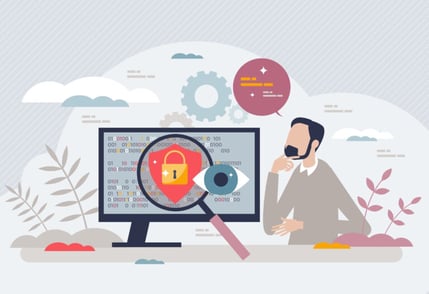Often when starting a conversation about developing a small to medium sized business’s (SMB) cyber program, the question comes up from the client: “Shouldn’t we get a SOC II certification?” While this is considered the gold standard for data security compliance, this may not be the best starting point for most SMBs.
What is the SOC 2?
The Service Organization Control (SOC) is a framework designed by the American Institute of CPAs (AICPA) to manage and secure sensitive data stored in the cloud. It involves a thorough audit process that evaluates an organization's controls and safeguards related to security, availability, processing integrity, confidentiality, and privacy of customer data. The audit and attestation can only be completed by Certified Public Accountant (CPA) firms. The SOC 2 certification confirms implementation of the most stringent security and availability measures that align with worldwide industry standards and best practices, as set by the AICPA. However, there are two types of SOC 2 reports:
- SOC 2 Type I: looks at controls at a single point in time.
- SOC 2 Type II: looks at controls over a period of time, usually between 3 and 12 months. The type II report also attests to the design, implementation, and effectiveness of the controls. As a result, the SOC 2 Type II audit results in a greater level of detail and visibility into the client’s system, providing a higher level of assurance to customers and partners.
So what are SOC 1 and SOC 3?
A SOC 1 report focuses on the internal controls for an organization’s financial reporting, and doesn’t play a directly role in evaluating security.
A SOC 3 report is a public-facing version of the SOC 2 report intended for publication or distribution without the need for a non-disclosure agreement. Since the SOC 3 report is intended to be publicly disseminatable, any sensitive security information which could be used by potential hackers has been removed.
SOC 2 Challenges for Small Businesses:
- Resource Constraints: Small businesses often operate with limited resources, both in terms of personnel and budget. Achieving and maintaining SOC 2 compliance requires a substantial investment of time, money, and skilled professionals. For SMBs with less than 50 employees, the average cost of a SOC 2 audit is approximately $91,000. For larger organizations with 50 to 250 employees, the average cost rises to $186,000.
- Complexity of the Process: The certification process involves intricate technical and procedural requirements. Small businesses may find it challenging to navigate this complexity without dedicated expertise. The duration of SOC 2 audits usually range from seven to ten months.
- Applicability of SOC 2 Criteria: Does your organization handle personally identifiable information, health care data, or payment information? If not, the specific criteria for SOC 2 may not be entirely relevant to your business, especially if you do not handle large volumes of sensitive customer data.
The Case for SOC 2 Certification:
- Customer Trust and Market Differentiation: SOC 2 certification can be a powerful tool for small businesses to build trust among customers and partners. It serves as a testament to a company's commitment to maintaining the highest standards of data security. As your customers grow, their security requirements for your business will increase. This often involves answering lengthy questionnaires consisting of hundreds of questions to provide evidence of the security controls your company has in place. There are many different security questionnaire formats, which can lead your company having to provide security information over and over, but in slightly different formats for each customer. The SOC II replaces the need for answering vendor questionnaires in most instances, as it is considered the most thorough standard that is widely accepted.
- Data Protection and Compliance: In an era of increasing data breaches and privacy concerns, SOC 2 certification helps businesses establish comprehensive data protection practices. It also ensures compliance with industry regulations and standards.
- Risk Mitigation: Certification provides a structured approach to identifying and mitigating risks associated with data security. This is particularly crucial for small businesses that may lack the resources to recover from a significant security incident.
Alternatives to Full SOC 2 Certification:
- SOC 2 Readiness Assessments: Small businesses can opt for a SOC 2 readiness assessment before committing to full certification. This provides insights into areas that need improvement without the full-scale audit.
- Industry-Specific Standards: Depending on the industry, there may be alternative standards or certifications that are more tailored to a small business's operations. Exploring these options can provide a more practical approach.
- Continuous Improvement: Instead of viewing certification as a one-time achievement, small businesses can focus on a culture of continuous improvement in cybersecurity. Implementing best practices and gradually enhancing security measures can be a pragmatic approach.
While SOC 2 certification undeniably offers numerous benefits, its applicability to small businesses depends on various factors. Small businesses must weigh the advantages of enhanced security, customer trust, and market differentiation against the challenges of resource constraints and the complexity of the certification process. Engaging in a thoughtful risk assessment and considering alternatives may lead to a more tailored and practical approach to securing sensitive data. Ultimately, the decision to pursue SOC 2 certification should align with the business's specific needs, goals, and industry context.
.png?width=230&height=66&name=Logo%20Transparency-1%20(1).png)


.png?width=110&height=110&name=ancient-scroll%20(1).png)
Comments